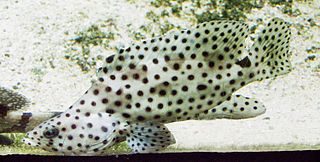
Serranidae is a large family of fishes belonging to the order Perciformes. The family contains about 450 species in 65 genera, including the sea basses and the groupers. Although many species are small, in some cases less than 10 cm (3.9 in), the giant grouper is one of the largest bony fishes in the world, growing to 2.7 m in length and 400 kg (880 lb) in weight. Representatives of this group live in tropical and subtropical seas worldwide.

The Carangidae are a family of ray-finned fish that includes the jacks, pompanos, jack mackerels, runners, trevallies, and scads. It is the largest of the six families included within the order Carangiformes. Some authorities classify it as the only family within that order but molecular and anatomical studies indicate that there is a close relationship between this family and the five former Perciform families which make up the Carangiformes.

The superorder Elopomorpha contains a variety of types of fishes that range from typical silvery-colored species, such as the tarpons and ladyfishes of the Elopiformes and the bonefishes of the Albuliformes, to the long and slender, smooth-bodied eels of the Anguilliformes. The one characteristic uniting this group of fishes is they all have leptocephalus larvae, which are unique to the Elopomorpha. No other fishes have this type of larvae.

Anthias are members of the family Anthiadidae in the order Perciformes. The group has also been called Anthiidae or Anthiinae, but these names are preoccupied by a subfamily of ground beetles in the family Carabidae erected by Bonelli in 1813.
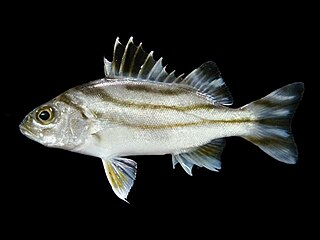
Grunters or tigerperches are ray-finned fishes in the family Terapontidae. This family is part of the superfamily Percoidea of the order Perciformes.
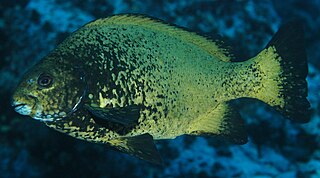
The sea chubs, also known as rudderfish and pilot fish and in Hawaiian as enenue or nenue, are a family, Kyphosidae, of fishes in the order Perciformes native to the Atlantic, Indian and Pacific Oceans usually close to shore in marine waters.

Sardinella is a genus of fish in the family Dorosomatidae found in the Atlantic, Indian and Pacific Ocean. They are abundant in warmer waters of the tropical and subtropical oceans. Adults are generally coastal, schooling, marine fish but juveniles are often found in lagoons and estuaries. These species are distinguished by their ranges and by specific body features, but they are often confused with one another. Fish of the genus have seven to 14 striped markings along the scales of the top of the head. The paddle-shaped supramaxilla bones are characteristic; they separate Sardinella from other genera and their shapes help distinguish species. They have paired predorsal scales and enlarged fin rays.

Lutjanidae or snappers are a family of perciform fish, mainly marine, but with some members inhabiting estuaries, feeding in fresh water. The family includes about 113 species. Some are important food fish. One of the best known is the red snapper.

Hyporhamphus is a genus of halfbeaks. The species in this genus are distributed throughout the warmer seas of the world, most species being Indo-Pacific and there are some freshwater species.

Amblygaster is a small genus of sardinellas in the herring family Dorosomatidae. It currently contains four species. They are found in Indo-West Pacific regions.

Microthrissa is a genus of freshwater ray-finned fishes belonging to the family Dorosomatidae, which also includes the gizzard shads and sardinellas. The species in this genus are endemic to Africa.

Odaxothrissa, the fangtooth pellonulines, is a genus of fresh-water fish in the family Dorosomatidae. All the extant species in this genus are found in tropical Africa.

The Congrinae are a subfamily of eels in the family Congridae.

Procatopodinae is a subfamily of the family Poeciliidae, the "livebearers", in the order Cyprinodontiformes. Some authorities treat this subfamily as a family, the Procatopodidae, including the banded lampeye.
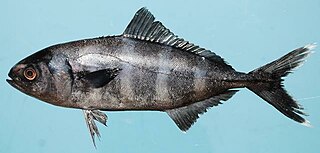
Naucratinae is a subfamily of ray-finned fish from the family Carangidae which consists of five genera and 13 species.

Paradicichthyinae is a subfamily of marine ray-finned fishes, one of four subfamilies classified within the family Lutjanidae, the snappers.

Scorpaeninae is a subfamily of ray-finned fish belonging to the family Scorpaenidae in the order Scorpaeniformes, it includes the scorpionfishes, the lionfishes and turkeyfishes. They bear venomous spines in the anal, dorsal and pelvic fins which can cause severe pain in envenomated humans. The subfamily is distributed in the tropical and temperate seas around the world.

Scorpaenini is a tribe of marine ray-finned fishes, one of two tribes in the subfamily Scorpaeninae. This tribe contains the "typical" or "true" scorpionfishes. The taxonomy of the scorpionfishes is in some flux, the 5th Edition of Fishes of the World treats this taxa as a tribe within the subfamily Scorpaeninae of the family Scorpaenidae within the order Scorpaeniformes, while other authorities treat it as a subfamily within a reduced family Scorpaenidae within the suborder Scorpaenoidei, or the superfamily Scorpaenoidea within the order Perciformes.
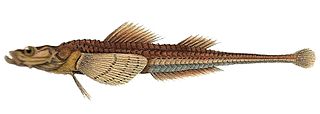
Brachyopsinae is a subfamily of marine ray-finned fishes belonging to the family Agonidae, part of the sculpin superfamily Cottoidea. These fishes are found in the North Pacific Ocean.

Ehiravidae is a family of clupeiform fishes. It is now recognized by FishBase as a family in its own right; it had been considered to be a subfamily of Clupeidae. It contains eleven extant genera.




















